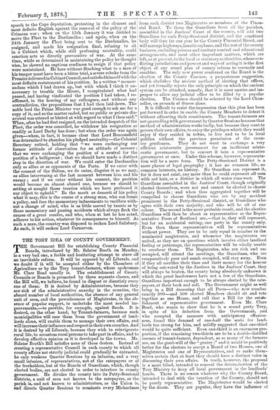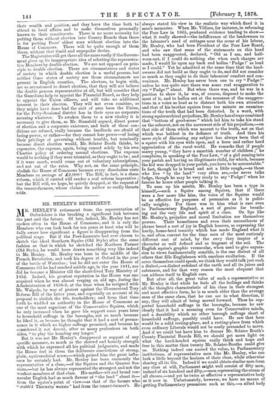TELE TORY IDEA OF COUNTY GOVERNMENT.
THE Government Bill for establishing County Financial Boards introdneed by Mr: Mater Booth on Monday, is -a very bad one, a feeble and hesitating attempt to stave off an inevitable reform. tt Wilt be opposed. by all Liberals, and we doubt if it Will be accepted either by the Chambers of Agriculture or by the Tory tenant-farmers, whOse spokesman Mr. Clare Read usually is The establishment of County Councils or Boards is promoted by three separate classes, and the. Rill will, we believe, be found to disgust or dissatisfy every one of them:. It is desired by Administrators, because they are sick of the administrative anarchy in the counties, the absurd number of local authorities, the absence of any general unit of area,. and the powerlessness of Magistrates, in the ab- sence of popular support, to undertake the most needed im- provements,—to provide, for example, against floods. It is desired, on the other hand, by Tenant-farmers, because such municipalities will' ease them from the government of land- lords alone, wilt enable them to manage their own affairs, and will increase their influence and respect in their own counties. And it is desired by all Liberals, because they wish to reinvigorate rural' life, to accustomaural persons to take part in affairs, and to develop effective opinion as it is developed in the towns. Mr. &later Booties Bill satisfies none of these desires. Instead of creating, a, representative Council in each county to which all county affairs not strictly judicial could gradually be entrusted, he only, weakens Quarter Sessions by an infusion, and a very small infusion, of representatives, not of the ratepayers or of the freeholders,.but of. the Boards of Guardians, which, though elected bodies, are not elected in order to interfere in county government. He divides the county into its Petty-Sessional districts, a unit of area not known to the ratepayers, as the parish ie, and not known to administrators, as the Union is, and directs Quarter Sessions to nominate every Michaelmas from each district two Magistrates as members of the Finan- cial Board. To them the Guardians from all the parishes, assembled in the Justices' Court of the county, will add two Guardians for each Petty-Sessional district, and the combined body will then for one year be the County Financial Board, and will manage highways, lunatic asylums, and the rest of the county business, excluding prisons and sanitary control and educational arrangements, and most other important matters, which are left, as at present, to the local or statutory authorities, whose con- flicting jurisdictions and powers and ways of acting it is the first object of any sound plan of county reform to reconcile and combine. The only new power conferred on the Board is the election of the County Coroner, a preposterous suggestion, which abolishes the ancient method of electing that officer, and yet formally rejects the only principle on which the ancient system can be attacked, namely, that it is most unwise and im- proper to allow any judicial office to be filled by a popular election. The Coroner should be selected by the Lord Chan- cellor, on grounds of fitness alone.
It is difficult to resist the impression that this plan has been put forward in order to enable the County Members to defeat it without affronting their constituents. The tenant-farmers are not quarrelling with government by Quarter Sessions because that method of administration works badly, but because they want to govern their own affairs, to enjoy the privileges which they would enjoy if they resided in tottns, to live and to be in local politics without the previous permission of the coun- try gentlemen. They do not want to exchange a very efficient aristocratic government for an inefficient aristo- cratic government, but to convert it into a representative government at once. Under this scheme, however, representa- tion will be a mere form. The Petty-Sessional District is a more phrase of legal geography ; it has no common life, no common interests, no history. No Guardian can represent it, for it does not exist, any more than he could representall .men with red hair, or a district in which all water runs west: The Guardians assembled in the Justices' Court, though originally elected themselves, were not and cannot be elected to choose County Boards ; and when thus aggregated together will be compelled to choose Guardians who are by any accident prominent in the Petty-Sessional district, or Guardians who agree with their own majority, and who will be all of one colour. The second is the more probable result, and the elective Guardians will then be about as representative as the Repre- sentative Peers of Scotland are,—that is, they will represent, but for an accidental ratting, one party in the county only. Even then these representatives will be representatives without power. They are to be only equal in number to the nominated magistrates, and whenever the magistrates are united, as they are on questions which involve either landlord feeling or patronage, the representatives will be wholly unable to overbear them. The Magistrates, who are rich and. un- occupied, will attend the meetings, the Guardians, who are comparatively poor and much occupied, will stay away. Even if they all sacrifice their time and their money for the honour of being out-voted by the Justices in the Justices' Court, they will always be beaten, the county being absolutely unknown in which the great landowners have not a few of the Guardians, Guardians important enough to be always elected by the rate- payers, at their beck and call. The Government might as well bring in a Bill decreeing that all Peers—who now number exactly 500—and 500 elected Members should sit and vote together as one House, and call that a Bill for the estab- lishment of representative government. Even Mr. Clare Read, who wants to show that he is a sound party Tory, in spite of his defection from the Government, and who accepted the measure with anticipatory effusive- ness, found this demand of one-half the seats for land- lords too strong for him, and mildly suggested that one-third would be quite sufficient. Even one-third is an enormous pro- portion, if the remaining two-thirds are to be a double-distilled essence of tenant-farmer, dependent, as so many of the farmers are, on the good-will of the "gentry ;" and it would be positively better for the electors to accept a Board of two Houses, one of Magistrates and one of Representatives, and so make them- selves certain that at least they should have a distinct voice in discussing their own affairs. In truth, however, the proposal is a mere blind, intended to conceal the determination of the Tory Ministry to keep all local government in the landlords' hands. There is no reason whatever why the County Board, intended to deal with the taxation of the County, should not be purely representative. The Magistrates- would be elected by the dozen. They are popular, they have the influence of their wealth and position, and they have the time both to attend to local affairs and to make themselves personally known to their constituents. There is no more necessity for putting them without election into County Boards than there is for putting Peers' eldest sons without election into the House of Commons. There will be quite enough of them there, without that timid and unpopular device. The Magistrates will get there all the more easily if the Govern- ment gives up its inappropriate idea of selecting the representa- tive Members by double election. We are not opposed on prin- ciple to double election. There are circumstances and states of society in which double election is a useful process, but neither those states of society nor those circumstances are present in English counties. The electors, to begin with, are so accustomed to direct election, that they will not believe the double process representative at all, but will consider that the Guardians help to appoint the Financial Board, as they help to appoint the Union officers, and will take no additional interest in their election. They will not even combine, as they might have done had the unit of area been the Union, for the Petty-Sessional district has in their eyes no corporate meaning whatever. To awaken them to a new vitality it is necessary to give them, as Mr. Stansfeld argued, direct power of election and a corporate existence, and both of these con- ditions are refused, really because the landlords are afraid of losing power, or rather—for they cannot lose power—of losing their privilege of governing without trouble, but nominally because direct election would, Mr. Selater Booth thinks, be expensive, the expense, again, being caused solely by his own Chartist policy of ordering annual elections. The expense would be nothing if they were triennial, as they ought to be ; and if it were much, would come out of voluntary subscriptions, and not out of the rates. Why not, on the same principle, abolish the House of Commons because every dissolution costs Members an average of £2,000? The Bill, in fact, is a sham reform, which if carried will render a real reform imperative ; but the Bill will, we hope, be quietly dropped, at the request of the tenant-farmers, whose claims its author so coolly thrusts _aside.



































 Previous page
Previous page